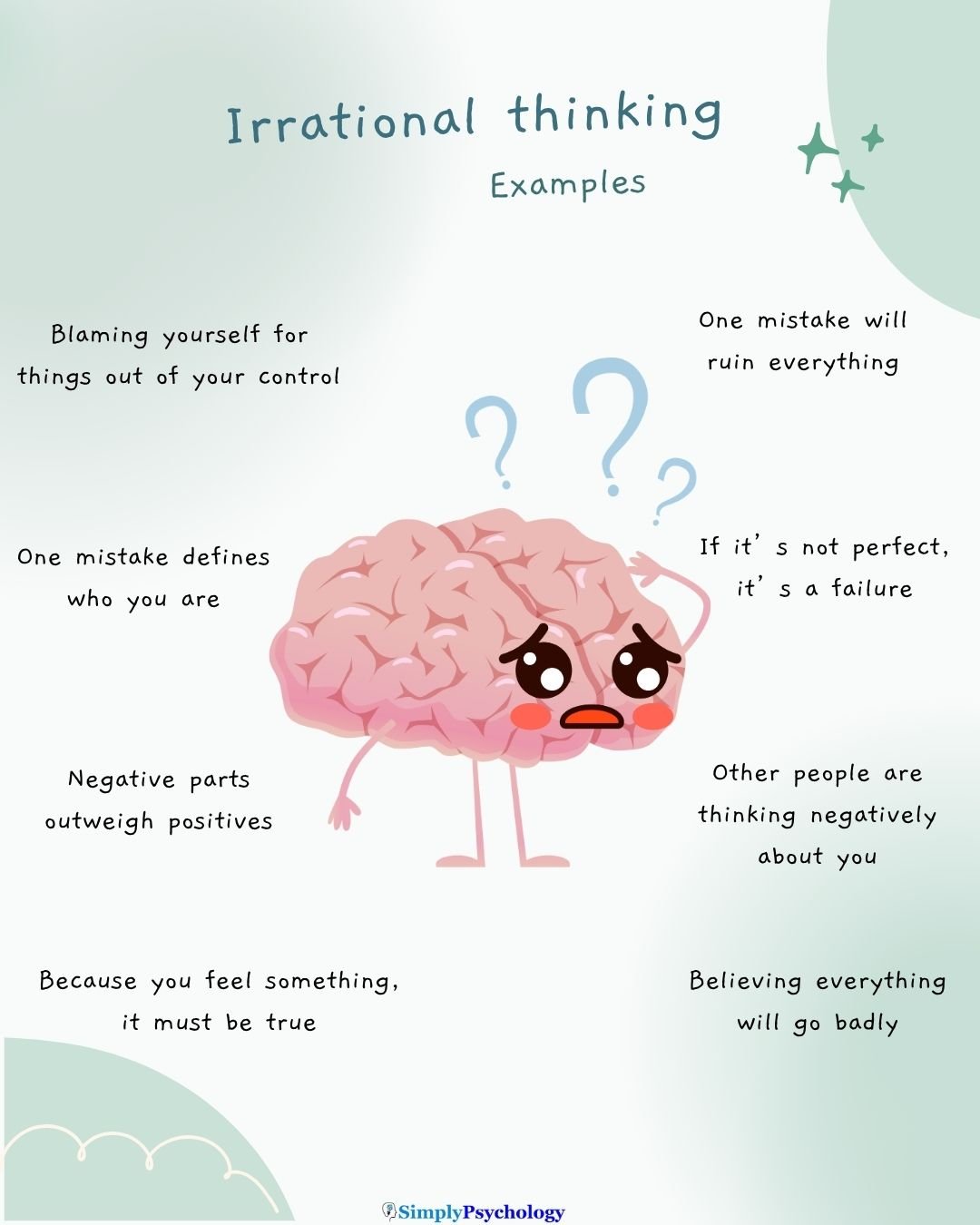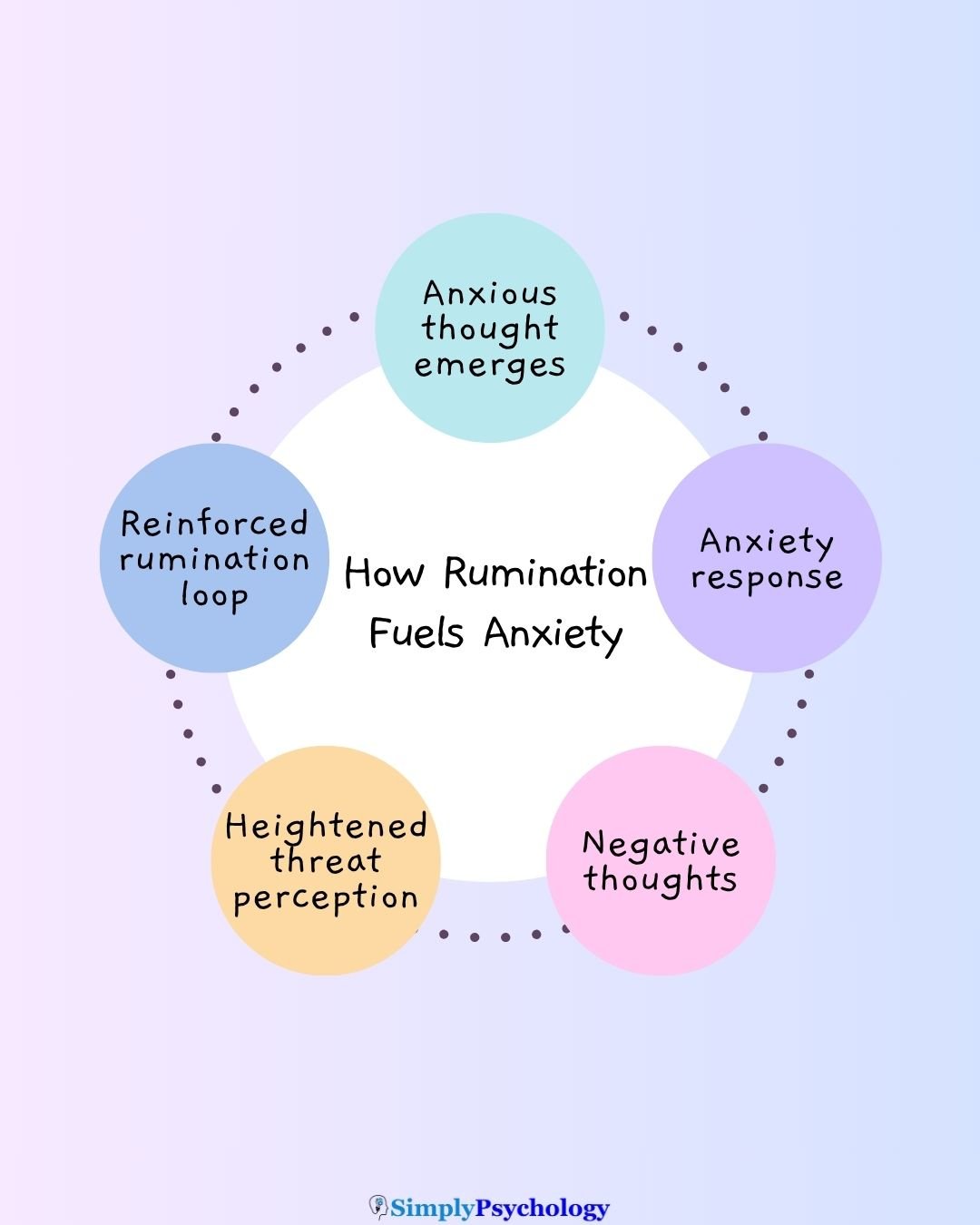It’s common to experience a sudden thought that makes no logical sense yet triggers intense anxiety or fear. These are often irrational thoughts – ideas or mental images that aren’t based on reason, evidence, or logic.
In everyday terms, an irrational thought is one that distorts reality and is illogical, often leading us to overestimate threats or assume the worst without proof. Such thoughts might tell us something terrible is about to happen, even when there’s little or no evidence for it.
Download our free reflection sheet on this topic:
Irrational Thoughts Reflection Sheet
Many people, especially those dealing with anxiety, find these irrational thoughts creeping in and causing distress. You might logically know a fear isn’t likely to come true, yet still feel the emotional impact as if it were.
Understanding Irrational Thoughts
Psychologists have studied irrational thoughts extensively because they play a key role in emotional well-being.
Albert Ellis, founder of Rational Emotive Behavior Therapy (REBT), described them as illogical, distorted patterns of thinking that hold us back from our goals. These thoughts aren’t accurate reflections of reality, and instead of helping us, they often lead to distress or self-sabotage.
In modern cognitive-behavioral therapy (CBT), many irrational thoughts are known as cognitive distortions—mental shortcuts or errors that convince us something false is true.
These distortions don’t just skew our perception—they fuel anxiety, depression, anger, and guilt.
Importantly, irrational thoughts are completely normal. Everyone has them now and then. For example, before a big presentation, you might think, “I’m definitely going to mess this up,” even if you’re well-prepared.
That thought isn’t based on evidence, so it’s irrational—but it’s also a common stress response.
In small doses, irrational thoughts can be harmless or even motivating. But when they become frequent, persistent, or taken too seriously, they start to interfere with daily life.
The problem isn’t having the thought—it’s believing and acting on it without question.
Common Irrational Thought Patterns
Irrational thoughts often follow recognizable patterns. Being able to spot these patterns can help you realize when a thought might be misleading or unhelpful. Some common types of irrational thoughts include:
- Catastrophizing (Expecting the Worst): Always assuming the worst possible outcome in any situation. For example, if you have a minor headache, you immediately worry it’s a brain tumor. This is expecting the worst outcome from any situation, magnifying a small issue into a catastrophe.
- Filtering Out Positives: Ignoring the good sides of a situation and focusing only on the negatives. For instance, after a performance review at work that has both praise and some criticism, you dwell only on the criticism and conclude you’re doing a terrible job.
- All-or-Nothing Thinking: Seeing things as either entirely one way or another – usually either all good or all bad – with no middle ground. This black-and-white thinking might make you think, “If I made one mistake, I’m a complete failure,” when in reality, people and situations are usually a mix of strengths and weaknesses.
- Personalization: Blaming yourself for everything or assuming others’ actions are always reactions to you. In this pattern, you consider yourself the sole cause of negative events. For example, if a friend is not very talkative one day, you immediately think “I must have done something wrong to upset them,” rather than considering they might just be having a bad day.
The key point is that irrational thoughts often sound like exaggerations, generalizations, or biased judgments. They “feel” true in the moment but usually don’t hold up under scrutiny.
Irrational Thoughts and Anxiety: Why Do They Happen?
Anxiety and irrational thoughts tend to amplify each other in a loop. An irrational thought triggers anxious feelings, and that anxiety makes the irrational thought stick around or grow stronger.
Irrational thoughts can act as fuel for the fire of anxiety, leading to rumination. This rumination then creates a cycle of fear: the more you think about the scary idea, the more anxious you feel; the more anxious you feel, the more your mind generates and clings to frightening thoughts.

But why does our brain do this to begin with?
Often, it comes down to fear and a desire for control. When we’re anxious, our brains are on high alert for threats. We can start overestimating danger and underestimating our ability to cope.
Anxiety makes a person feel they “must have it all figured out” and be prepared for every possible outcome, which of course is not always possible. Anxiety tries to eliminate uncertainty by obsessing over every potential problem – leading to thoughts that something terrible is imminent or that you won’t be able to handle it.
Irrational thoughts are often fueled by the question, “What if?”. What if something goes wrong? What if I embarrass myself? By imagining these scenarios, your mind is trying to prepare you for threats – as if anticipating the worst will somehow cushion the blow or help you avoid it.
Personal Experiences: How Irrational Thoughts Feel
If you struggle with anxiety, it might help to know you’re not alone – many others have shared similar experiences of grappling with irrational thoughts:
One individual, for instance, described a terrifying thought that “I’m stuck in a dream and none of this is real.”
They explained that deep down they knew this feeling was just their anxiety “tricking” them, but they “can’t help but be defeated by this irrational thought” and still find it overwhelmingly scary.
Another person shared how health anxiety gave rise to a whole string of irrational thoughts about their body.
They became hyper-aware of every sensation and symptom, and their mind would jump to catastrophic explanations.
For example, “If my heart’s beating too fast, I think I have a heart condition, or I’m going to suddenly die of a heart attack,” they noted.
These personal accounts underline a few key things: Irrational thoughts often come with strong physical feelings (like panic, unreality, or urge to check oneself), they persist despite logical evidence, and they make people feel isolated or even “crazy” – when in fact, many people have very similar experiences.
How Irrational Thoughts Affect Mental Health
When irrational thoughts become frequent or intense, they can seriously affect your mental well-being. They fuel anxiety, and in turn, anxiety strengthens those thoughts—creating a vicious cycle.
Over time, this can lead to chronic stress, irritability, sleep problems, and even depression.
Research found that irrational beliefs are strongly linked to emotional distress, particularly higher levels of anxiety and depression.
The more weight you give these unrealistic thoughts, the more they can erode your mood and resilience.
Shrinking Your Life and Confidence
Irrational thoughts don’t just affect emotions—they also limit behavior. Someone who fears “something bad will happen if I leave the house” may begin avoiding social situations, leading to loneliness or missed opportunities.
Others may hold beliefs like “I always fail” or “I’ll embarrass myself,” causing them to avoid promotions, school, or speaking up.
Over time, this can undermine self-esteem and create a self-fulfilling prophecy, reinforcing the very fears that started the cycle.
Not All Irrational Thoughts Are Equal
It’s important to note that occasional irrational thoughts are normal. You might think “my friend must be mad at me,” then realize you’re jumping to conclusions and move on. These passing thoughts typically do little harm.
But under chronic stress or anxiety disorders, irrational thoughts can become persistent and overwhelming.
Challenging and Managing Irrational Thoughts
Overcoming irrational thoughts often starts with a three-step process often summarized as “Catch it, Check it, Change it.”
This comes from cognitive-behavioral therapy (CBT) principles and is even promoted in self-help resources by organizations like the NHS (National Health Service in the UK) for anxiety management. Here’s how it works:
- Catch It: Identify the irrational thought. Ask yourself, “What thought went through my mind just now?” By catching the thought, you bring it out of the shadows. Simply recognizing this specific thought is the first step. Often just labeling a thought as potentially irrational or unhelpful gives you a bit of distance from it.
- Check It: Challenge the thought by checking the evidence and logic. Essentially, you become a detective and ask questions: “Is this thought really true? What evidence do I have for and against it?”. Also, consider alternative interpretations: “Are there other ways to look at this situation?” and “How likely is the outcome I’m worried about?”. This stage is about questioning the irrational thought’s power.
- Change It: Reframe the thought into something more balanced or realistic. This doesn’t mean turning everything into overly sunny positivity, but rather finding a thought that is accurate and helpful instead of distorted and harmful. By consciously choosing a more rational thought, you teach your brain a new, healthier pattern over time.
Beyond these steps, there are other tools and habits that can help manage irrational thoughts:
Use a Thought Record
This is a CBT exercise where you write down the situation, your irrational thought, the feelings it caused, then gather evidence for and against the thought, and finally write a more balanced conclusion.
Thought records help make the “catch it, check it, change it” process very concrete.
Many people find that writing down their fears and then logically dissecting them weakens the power of those fears.
Mindfulness and Grounding Techniques
Since irrational thoughts thrive on future “what ifs” or out-of-proportion fears, practices that keep you grounded in the present moment can help.
Mindfulness meditation, for example, teaches you to observe thoughts passing by without getting wrapped up in them.
Even simple deep-breathing exercises or techniques like describing your surroundings can pull you out of a mental spiral and back to reality when a thought like “I’m about to faint” or “Everything is going wrong” threatens to overwhelm you.
Focus on Problem-Solving
If the irrational thought concerns a solvable problem (say, worrying about an upcoming test), shift into action.
Make a study plan, talk to a tutor, etc. Taking constructive steps can reassure your brain that you are not helpless.
Some irrational thoughts will fade when you’ve taken whatever reasonable precautions you can – and for the rest, remind yourself that you’ve done what’s in your control.
Focusing on what you can do tends to increase your sense of control and resilience.
Limit Reassurance-Seeking and “Google-ing”
Many people with health-related irrational thoughts fall into a trap of constantly seeking reassurance (asking others “Do you think I’m ok?” over and over) or compulsively searching the internet for dire explanations of symptoms.
While it’s natural to seek some reassurance, overdoing it actually reinforces the irrational thoughts (you indirectly tell your brain the thought was valid enough to warrant so much checking).
Try to sit with the uncertainty a bit longer before rushing to reassure yourself via Dr. Google or repeated questions – often the anxiety spike will peak and then subside on its own.
Talk to Someone
Sometimes, sharing the irrational thought with a trusted friend, family member, or therapist can bring relief.
They can provide a reality check (“You’ve gotten through this before, remember?”) or at least comfort you.
Don’t be ashamed – saying it out loud (“I have this irrational fear that when my phone rings, it’s going to be terrible news”) often makes you realize how unlikely it is, and a supportive person can gently point out evidence against the fear. If nothing else, you’ll feel less alone with your worry.
If irrational thoughts are frequently disrupting your life, consider seeking professional help. Therapists are very familiar with these thinking patterns and can guide you through techniques like the ones above in a personalized way.
References
Vîslă, A., Flückiger, C., Grosse Holtforth, M., & David, D. (2016). Irrational beliefs and psychological distress: A meta-analysis. Psychotherapy and psychosomatics, 85(1), 8-15.

